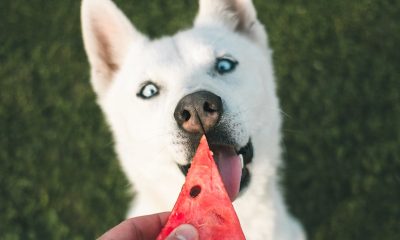Dog Food
Fermented Dog Food: Pros and Cons

Are you curious about the benefits and drawbacks of feeding your furry friend fermented dog food? Look no further!
In this article, we’ll explore the pros and cons of incorporating this unique diet into your pup’s routine.
From improved digestion and nutrient absorption to potential risks and feeding guidelines, we’ve got you covered.
So, sit back, relax, and let us serve you the information you need to make the best decision for your beloved canine companion.
Health Benefits of Fermented Dog Food
You should consider the potential health benefits of feeding your dog fermented dog food. Incorporating fermented dog food into your pet’s diet can provide numerous benefits, especially when it comes to improving their overall well-being.
One of the key advantages of fermented dog food is the presence of probiotics, which are beneficial bacteria that support a healthy gut. These probiotics help in maintaining a balanced gut microbiome, which plays a crucial role in your dog’s digestion and immune system.
By introducing probiotics through fermented dog food, you can enhance your dog’s digestion and nutrient absorption. This can lead to better overall health and increased energy levels. Additionally, probiotics can strengthen your dog’s immune system, making them less susceptible to illnesses and infections.
Furthermore, fermented dog food can help with food sensitivities and allergies. The fermentation process breaks down complex proteins, making them easier for your dog to digest. This can be especially beneficial for dogs with sensitive stomachs or those prone to allergies.
Potential Risks and Concerns
Be aware of the potential risks and concerns associated with feeding your dog fermented dog food. While there are benefits to incorporating fermentation into your dog’s diet, it’s important to understand the potential drawbacks. Here are three key points to consider:
- The fermentation process: Fermentation involves the breakdown of carbohydrates in food by bacteria or yeast. While this process can enhance the nutritional value of the food, it can also lead to the production of gas and bloating in dogs. Some dogs may be more sensitive to the fermentation process and experience digestive issues as a result.
- Microbial contamination: Fermentation creates an environment where bacteria can thrive. If not done properly, there’s a risk of microbial contamination in fermented dog food. This can lead to foodborne illnesses in dogs, causing symptoms like vomiting, diarrhea, and even more serious health complications.
- Individual dog’s health: Every dog is unique and may react differently to fermented dog food. Some dogs may benefit from the probiotics and improved digestion, while others may experience adverse reactions. It’s important to monitor your dog closely and consult with a veterinarian if you notice any changes in their health or well-being.
While fermented dog food can offer potential benefits, it’s crucial to weigh the risks and concerns associated with the fermentation process and microbial contamination. Always prioritize your dog’s health and consult with a professional before making any significant changes to their diet.
Enhanced Digestibility and Nutrient Absorption
There are three key benefits to incorporating fermentation into your dog’s diet, including enhanced digestibility and nutrient absorption. By introducing fermented foods into your dog’s meals, you can improve their gut microbiome, leading to a healthier and more balanced digestive system. Fermentation promotes the growth of beneficial bacteria in the gut, which can aid in the breakdown and absorption of nutrients.
Furthermore, fermented dog food can increase nutrient bioavailability, meaning that your furry friend will be able to extract more essential vitamins and minerals from their food. This is especially important for dogs with sensitive stomachs or those who struggle with nutrient deficiencies. Fermentation breaks down complex carbohydrates and proteins, making them easier for your dog’s body to process and utilize.
Incorporating fermented foods into your dog’s diet can also help alleviate digestive issues such as gas, bloating, and diarrhea. The beneficial bacteria produced during fermentation can improve overall gut health and reduce inflammation in the digestive tract.
Overall, incorporating fermentation into your dog’s diet can provide improved gut microbiome, increased nutrient bioavailability, and a healthier digestive system. By prioritizing their well-being through proper nutrition, you’re ensuring that your canine companion thrives and enjoys a happy, healthy life.
Impact on Gut Health and Immunity
By incorporating fermented foods into your dog’s diet, you can strengthen their gut health and boost their immunity. Fermentation is a natural process that involves the breakdown of carbohydrates by microorganisms like bacteria and yeast. This process not only enhances the flavor and digestibility of the food but also introduces beneficial bacteria into your dog’s gut, improving their gut microbiota.
Here are three benefits of incorporating fermented foods into your dog’s diet:
- Improved Digestion: Fermented foods contain probiotics, which are live bacteria that promote a healthy digestive system. These probiotics help break down food and increase nutrient absorption, reducing the risk of digestive issues such as diarrhea and constipation.
- Enhanced Immune Function: The gut is home to a large portion of the immune system. By strengthening your dog’s gut health through fermented foods, you can boost their immunity. The beneficial bacteria in fermented foods support the production of antibodies and enhance the body’s ability to fight off infections and diseases.
- Reduced Allergies and Sensitivities: Fermented foods can help alleviate allergies and sensitivities in dogs. The probiotics in these foods regulate the immune response, reducing the likelihood of allergic reactions. Additionally, fermented foods can improve the gut barrier function, preventing the absorption of allergens and reducing inflammation.
Feeding Guidelines and Considerations
When feeding your dog fermented foods, it’s important to follow the feeding guidelines provided by your veterinarian to ensure their nutritional needs are met. Establishing a feeding schedule is crucial for your dog’s overall health and well-being. Dogs, like humans, thrive on consistency, so it’s important to feed them at the same times every day. This helps regulate their digestive system and prevents any potential stomach upset.
Additionally, when introducing fermented foods into your dog’s diet, it’s essential to follow a transitioning process. Start by mixing a small amount of fermented food with their regular food, gradually increasing the proportion over time. This allows their digestive system to adapt to the new food and prevents any sudden dietary changes that may cause digestive discomfort.
Your veterinarian will provide specific feeding guidelines based on your dog’s age, breed, size, and overall health. They’ll also consider any specific dietary requirements or restrictions your dog may have. Following these guidelines ensures that your dog receives the right balance of nutrients and avoids any potential deficiencies or imbalances in their diet.
It’s important to remember that every dog is unique, so what works for one may not work for another. Consulting with your veterinarian is crucial for tailoring the feeding guidelines to your dog’s specific needs.
Frequently Asked Questions
Can Fermented Dog Food Help With Weight Management in Dogs?
Fermented dog food can be beneficial for weight management in dogs. The fermentation process breaks down nutrients, making them easier to digest. It can help your dog maintain a healthy weight.
Are There Any Specific Breeds or Age Groups of Dogs That Should Not Consume Fermented Dog Food?
If you have a specific breed or age group of dog, it’s important to know that not all dogs can consume fermented dog food. Consult your veterinarian to ensure your furry friend’s health and well-being.
Can Fermented Dog Food Be Used as a Remedy for Dogs With Food Allergies or Sensitivities?
Fermented dog food can be a remedy for dogs with food allergies or sensitivities. It provides digestive health benefits that can help alleviate symptoms and improve overall well-being.
How Long Does It Take for Dogs to Adjust to a Diet of Fermented Dog Food?
It may take some time for your dog to adjust to a diet of fermented dog food. However, the benefits of fermentation, such as improved digestion and nutrient absorption, can greatly improve their overall health and well-being.
Is It Necessary to Consult a Veterinarian Before Switching a Dog to a Diet of Fermented Dog Food?
Before switching your dog to a diet of fermented dog food, it’s crucial to consult a veterinarian. They can provide guidance on the benefits and potential risks of this type of diet.
-

 Health Issues3 years ago
Health Issues3 years agoIdentifying and Treating Parasites in Dogs
-

 Dog Food3 years ago
Dog Food3 years agoIdentifying And Treating Dog Food Allergies
-

 Dog Training3 years ago
Dog Training3 years agoUsing Treats Effectively When Dog Training
-

 Health Issues2 years ago
Health Issues2 years agoCommon Digestive Problems in Dogs and How to Address Them
-

 Dog Training2 years ago
Dog Training2 years agoUnderstanding Fear and Anxiety in Dogs and How to Help Them
-

 Dog Training2 years ago
Dog Training2 years agoThe Role of Punishment in Dog Training: Pros and Cons
-

 Dog Food2 years ago
Dog Food2 years agoWet Vs. Dry Dog Food: Which Is Better
-

 Health Issues2 years ago
Health Issues2 years agoEssential Vitamins and Minerals for Your Dog’s Health






























































